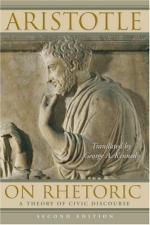Take our free On Rhetoric quiz below, with 25 multiple choice questions that help you test your knowledge. Determine which chapters, themes and styles you already know and what you need to study for your upcoming essay, midterm, or final exam. Take the free quiz now!
Directions: Click on the correct answer.
Questions 1-5 of 25:


